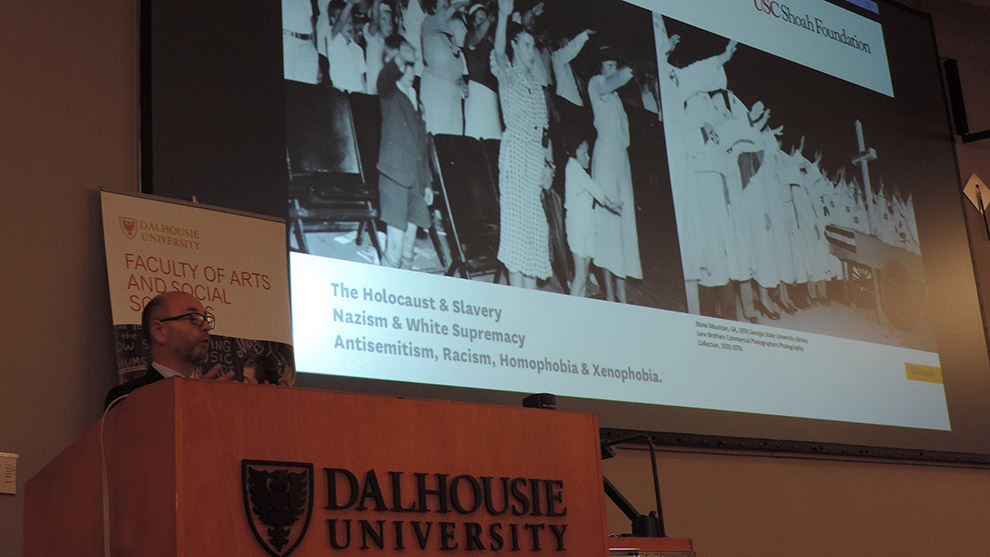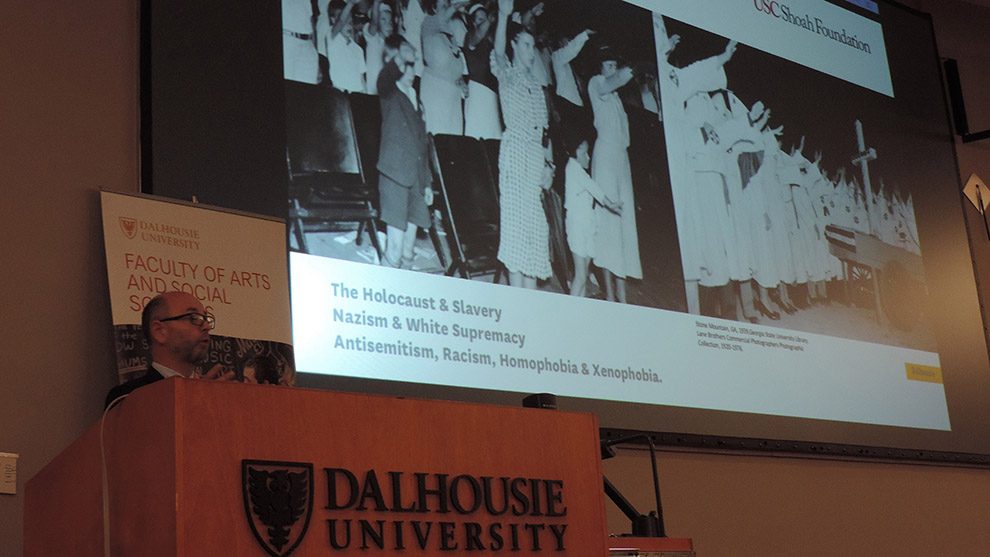Education
Genocide educator shows Halifax the power of the human story in tackling hate
Stephen Smith says confronting hate means getting out of your comfort zone

caption
Stephen Smith describes two photos, Nazi Germany and US KKK, both taken in 1938 and both men, women and children.
caption
Stephen Smith describes two photos, Nazi Germany and Ku Klux Klan, both taken in 1938 and both men, women and children.Globally recognized humanitarian Stephen Smith says the solution to countering hate is to translate global atrocities into local and relatable human stories.
Smith, the UNESCO chair on genocide education, was the speaker at Dalhousie University’s annual Shaar Shalom Lecture on Wednesday.
“The seeds of hate at home … begin young,” he told the audience. “That’s where the attitudes come, that’s where the values develop.”
Smith is the executive director of the University of Southern California Shoah Foundation, which was founded by director Steven Spielberg in order to preserve survivor testimonies in the process of creating Schindler’s List.
Smith said the Shoah Foundation holds over 115,000 hours of video testimonies. They aren’t just from the European Holocaust, but also include stories from Armenia, Cambodia, Guatemala, China, Rwanda and Myanmar. For Smith, all of these stories share a common thread: risk.
Smith described an interview he had with Helen Colin, a Holocaust survivor. He asked her what she felt in that moment, as she gave the first survivor interview on April 15, 1945.
It was “absolute rigid fear,” he said, noting Colin was talking 10 feet away from her captors. But she needed to share her story, he said.
Smith said that refugees show him detailed pictures. Through these pictures they are able to identify who was killed, at what time, place and location and by what method.
Smith said the digital age has created global community. With the greater ability to share and learn he said people have a greater local responsibility to learn from the impacts of hate.
Smith showed the modern ways of storytelling Shoah Foundation is using to share global stories in a way that is local and relatable. Holograms in ‘New Dimensions in Testimony’ and virtual reality for The Last Goodbye, Smith demonstrates to the audience how viewers can ask questions to a Holocaust survivor through the use of archived experiences.
Smith said there is much to learn from survivors. He urged the audience to get “out of (their) comfort zone,” and embark on challenging endeavours such as speaking and working with different people.
“Having spent 20 years with Holocaust survivor testimony, it never occurred to me before that testimony is something worth dying for, for the truth itself,” said Smith
Smith is also co-founder of Aegis Trust for the prevention of crimes against humanity and genocide and responsible for the creation of the Kigali Genocide Memorial Centre in Rwanda. It is now a centre for history, arts, education, and training.
Dalhousie grad Max Kirsh, who attended the lecture, said the topic of hate in the digital age is important in Halifax.
“I have a phone in my hand right now; I interact with thousands of people daily,” he said. “I just think that if you influence people to be positive, and lead by example, then you are doing the best that you can.”
Frank Harvey, Dean of the Faculty of Arts and Social Sciences at Dalhousie, said Smith was invited in light of the Shaar Shalom Lecture’s values of tolerance, multiculturalism, diversity and difference in Canada.
“(These values are being challenged) when the democratic institutions and states and the leaders that we typically rely on, defend and promote those values are failing,” he said.
About the author

Karli Zschogner
Karli Zschogner is part Nova Scotian and recently moved to Halifax for Journalism at the University of King's College. After her Bachelors in...
